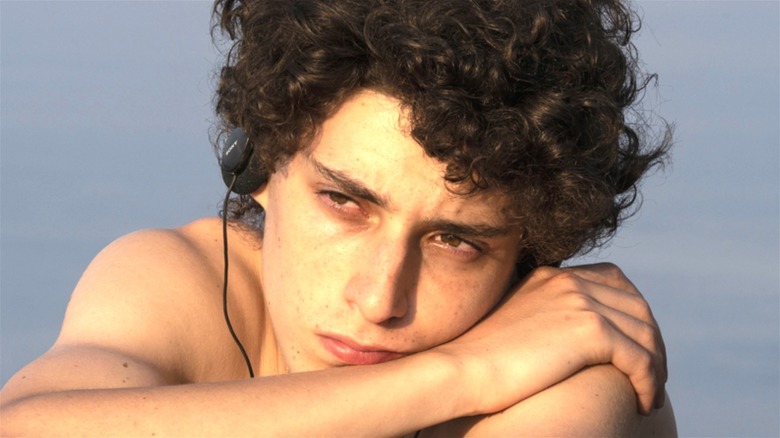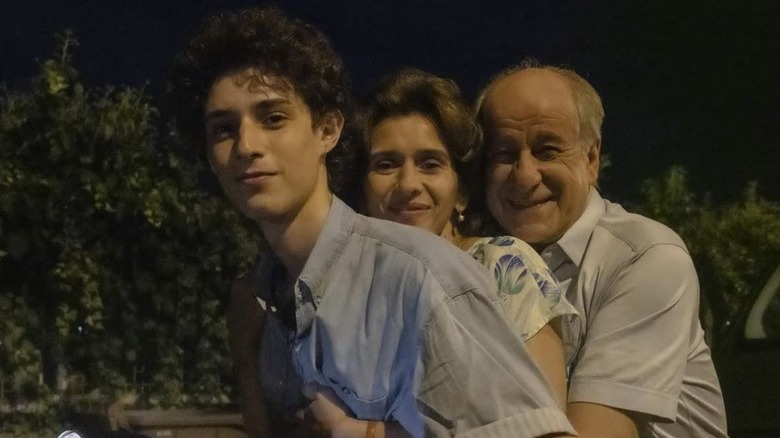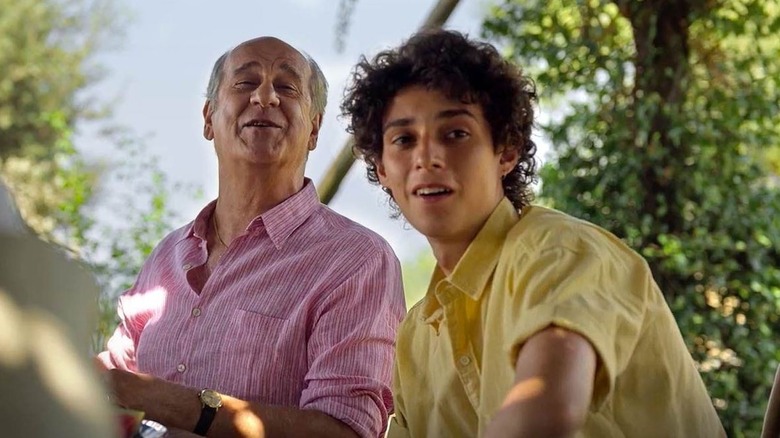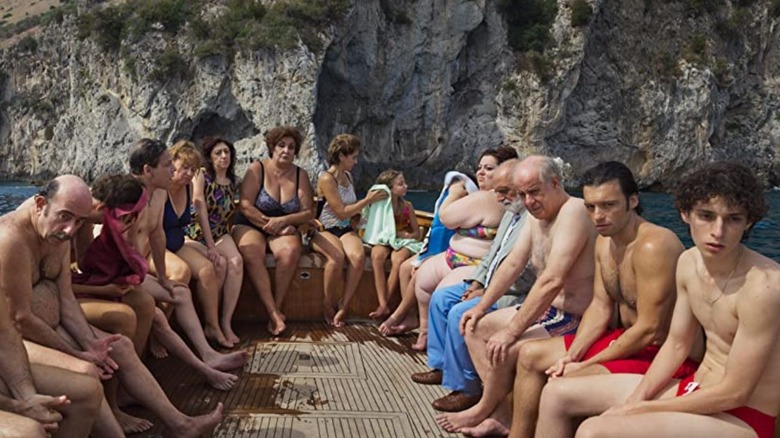The Ending Of The Hand Of God Explained
Director Paolo Sorrentino's ("The Young Pope," "The Great Beauty") newest drama, "The Hand of God," details the various struggles and dysfunctions of the Schisa family in Naples in the 1980s. Interestingly, much of it is juxtaposed with the real-life athletic heroics of Argentine soccer legend Diego Maradona, who shockingly joined the city's football team in 1984, and became a borderline saintly figure in the area (via The Guardian).
The central character is the lonely, reserved teenager Fabietto (Filippo Scotti), who balances on the edge of adulthood without really knowing what to do about it. He nurses a crush for his troubled exhibitionist aunt Patrizia (Luisa Ranieri), and cares deeply for his parents — affable, but two-timing Saverio (Toni Servillo), and prank-loving Maria (Teresa Saponangelo) — and his wannabe actor brother Marcino (Marlon Joubert). Unfortunately, the often humorous family antics of the movie's first half come to a crushing halt when Saverio and Maria suddenly die of carbon monoxide poisoning in their holiday home, which also happened to Sorrentino's parents in real life (via The Guardian).
From this point on, the movie's tone changes dramatically, and it maintains a laser-like focus on Fabietto and his attempts to find his way in life. But how do things go for him in the end? Here's the ending of "The Hand of God" explained.
There's more than one Hand of God in the movie
Because the soccer star's presence is very much a part of "The Hand of God's" essence, it's easy to assume that the title refers to Diego Maradona's infamous hand goal during his national team's 1986 World Cup quarter-final match against England. The goal indeed does get plenty of attention in the movie, but ultimately, there are other, more intimate and poignant events that could also apply for the name. The most notorious one of them comes when Fabietto and Marcino's parents die, and it turns out that the only reason the former didn't die with them was that he preferred to go watch Maradona play.
While those are the only two events the movie specifically names "The Hand of God," the movie is also bookended by two scenes that arguably also qualify. In the beginning of the film, Fabrizia visits the strange, diminutive Little Monk, who blesses her with fertility and gives her money. Per Corriere di Napoli, this character is a legitimate Neapolitan folklore figure known as Munaciello, believed to bless and help the people in need, and to punish the ones he dislikes.
The iconic Little Monk makes his second appearance at the very end of the movie, as Fabietto's train to Rome stops at a strange station, where the robed figure awaits. The Monk reveals his smiling face and happily waves at Fabietto, seemingly sending the newly mature young man to his destiny with some blessings of his own.
The Maradona effect
From the movie's very name to the many references to the athlete's heroics, Diego Maradona is the sole true constant in the movie, and in many ways, its plot is intertwined to his career trajectory in the mid-to-late 1980s. The movie's early, innocent stages happen when Maradona's arrival is just a rumor, and the news of his signing defuses a potentially disastrous situation at the Schisa household. His on-pitch heroics provide much-needed energy for the family to get things back on track, and the movie makes it very clear that the fact that Fabietto was so adamant to go see Maradona on the day his parents died saved his life — after all, he would otherwise have been in the apartment with them when the carbon monoxide leak happened.
It's a discussion about Maradona that helps Marcino put to words what he wants from life, and another that helps Fabietto find a friend. Even the very end of the movie — in which Fabietto gives his silent goodbyes to his remaining close ones, and departs on his road to adulthood — just so happens to coincide with Maradona's team winning the championship, and Fabietto begins his journey with people celebrating on the streets. It probably isn't a coincidence that he's wearing a shirt that looks quite a bit like Maradona's striped Argentina national team jersey during the scene.
All of this may sound pretty heavy-handed, but it really isn't. Maradona's omnipresence in the movie simply illustrates the star's massive impact in the lives of every Neapolitan of the era (per Goal). The reason he's everywhere in the movie is the simple fact that even today, his presence can be felt everywhere in Naples.
First half sets up, the second pays off
"The Hand of God" is a film that's not afraid to play around with symbolism, and even if you only watch the first half of the movie, you can rest pretty safe in the knowledge that the ending will revisit virtually all of its early themes ... though more often than not, they return with a twist after Saverio and Maria die. The movie begins when the extremely earthly Patrizia visits the mysterious, ethereal Little Monk, and ends when Patrizia herself seems to disappear from the balcony of her hospice. Meanwhile, the Little Monk reappears to greet the departing Fabietto, and his mystery shatters as he reveals his very normal face and waves excitedly. The tears Fabietto is unable to cry come when he least expects them. He finds an unexpected and much-wanted friend in one of the smugglers the Schisa family saw in the start of the movie. The famous director who's briefly glimpsed early on becomes an important figure later down the line. Even the reputedly cold-hearted Baronessa Focale (Betti Pedrazzi) and the pressing matter of Fabietto's first time with a lady are revisited — though in a way that the viewer might not immediately expect.
The final and arguably most important revisit comes in the very end, when Fabietto has a chance encounter with Capuano (Ciro Capano), a famous director seen briefly in an earlier scene. A heated discussion with the maestro is a crash course in movie-making and passion for the young boy, and it helps him find a direction ... even though it's not exactly the one Capuano recommends. After all, Fabietto is now capable of making his own decisions.



